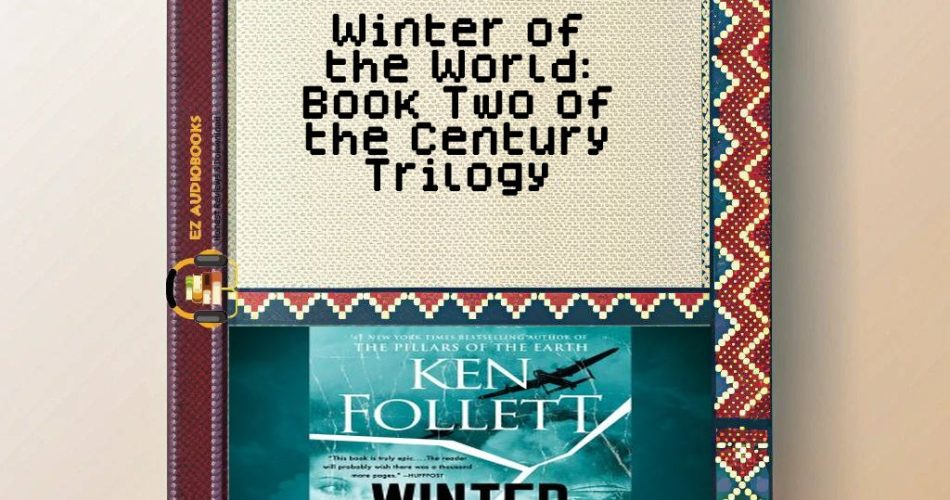Audiobook Sample
Listen to the sample to experience the story.
Please wait while we verify your browser...
- Title: Winter of the World: Book Two of the Century Trilogy
- Author: Ken Follett
- Narrator: John Lee
- Length: 31:45:00
- Version: Abridged
- Release Date: 18/09/2012
- Publisher: Penguin Audio
- Genre: Fiction & Literature, Historical Fiction, Sagas, War & Military
- ISBN13: 9.78E+12
There’s something profoundly intimate about listening to historical fiction while moving through landscapes that have witnessed their own layers of history. I remember driving through the Bavarian Alps a few years ago, snow clinging to ancient pines as I listened to another war-era tale, the narrator’s voice blending with the crunch of tires on frost. That same magical convergence of place and story happened again with “Winter of the World”, Ken Follett’s masterful second installment in the Century Trilogy, narrated with impeccable gravitas by John Lee.
Follett’s epic sweeps us through the turbulent mid-20th century like a time-traveling observer, with five interconnected families as our guides. As someone who’s spent years documenting how ordinary people navigate extraordinary circumstances in my travel writing, I was particularly struck by how Follett makes history personal. The way Carla von Ulrich’s story unfolds during the rise of the Third Reich reminded me of interviews I’ve conducted with elderly residents in Berlin, their voices still trembling decades later as they describe those dark years.
John Lee’s narration is nothing short of magnificent. He handles the sprawling cast with the precision of a master cartographer charting unknown territories – each character distinctly voiced, each accent meticulously crafted. When he delivers Woody Dewar’s Pacific war chapters, you can almost smell the jungle humidity and feel the tension in the pauses between sentences. It brought back memories of listening to my Oaxacan host grandmother’s war stories – the same careful pacing, the same emotional weight given to silence.
The audiobook’s 30+ hour runtime might seem daunting, but like a transcontinental train journey, the miles melt away through compelling storytelling. Follett’s greatest strength here is making geopolitical forces feel immediate and personal – whether it’s Lloyd Williams confronting fascism in Spain or Volodya navigating Soviet intelligence. The domestic dramas intertwine with world-shaking events in ways that remind me of how history truly happens: not in textbooks, but in living rooms and battlefields, through choices made by flawed, courageous people.
Some critics might argue the novel’s scope comes at the expense of depth in individual character arcs. While there were moments I wished for more lingering in certain emotional beats, Lee’s performance consistently bridges any gaps, imbuing even expository passages with urgency. His handling of Daisy Peshkov’s transformation from social climber to war-changed woman is particularly nuanced.
Compared to other historical sagas, “Winter of the World” stands out for its commitment to showing history’s interconnectedness – a theme close to my heart as a travel writer. The way German decisions affect American families, how Russian spies influence British fates, it all mirrors what I’ve observed in border regions worldwide: the fiction that any nation’s story stands alone.
For listeners who enjoyed “The Winds of War” or “The Nightingale”, this audiobook offers a similarly immersive experience with broader geopolitical scope. The production quality is excellent, with no distracting audio flaws – important for a story where a whispered conversation can carry as much weight as a battlefield explosion.
As someone who’s documented war memorials from Normandy to Hiroshima, I particularly appreciated how Follett and Lee honor the human scale of history. There’s a scene where characters debate whether to fight or flee the Nazis that gave me chills – not because of dramatic music or sound effects (there are none), but because Lee’s delivery makes you feel the terrible weight of that decision in your bones.
If you’re new to the Century Trilogy, I’d still recommend starting with “Fall of Giants”, but Lee’s consistent narration across the series makes jumping in here feasible. His voice has become the aural equivalent of a trusted historian guiding you through archives – you instinctively lean closer to catch every nuance.
The audiobook’s length allows Follett’s meticulous research to shine without feeling didactic. When characters discuss the Spanish Civil War or the Manhattan Project, you’re getting context woven naturally into drama, not history lectures. It reminds me of the best local guides I’ve encountered – those who can make a cobblestone street come alive with stories without ever sounding like they’re reciting from a textbook.
May your listening journeys be as rich as the stories themselves,
Marcus
Marcus Rivera

